Almost There: Marlene Dietrich in "Shanghai Express"
 Tuesday, February 23, 2021 at 5:50PM
Tuesday, February 23, 2021 at 5:50PM ![]()
A cabaret performer and silent film actress during the Weimar years, Marlene Dietrich left Berlin at the dawn of the 1930s. She abandoned Germany, traveling to Hollywood with director Josef von Sternberg who'd go on to make Dietrich into Tinseltown's most glamorous star. The pair of creative partners and off-screen lovers shot seven films together, all of them classics whose sensuous allure and grotesque opulence make for some of the weirdest pictures to come out of Hollywood at the time. Theirs was a cinema of provocation, hedonistic spectacles that overwhelmed the senses even as they moved at a lethargic pace as if the films themselves are bodies recuperating in the aftermath of an orgasm. As an avowed fan of Marlene Dietrich, this septet represents some of my favorite flicks, their dreams of celluloid working as siren songs that never fail to seduce and enchant.
The Criterion Channel is now streaming these seven glistening gems, so it's a good time to explore a Sternberg-directed Dietrich performance that came palpably close to an Oscar nomination. Let's talk Lily in Shanghai Express…
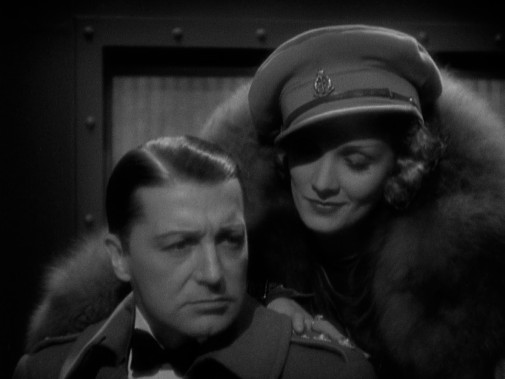
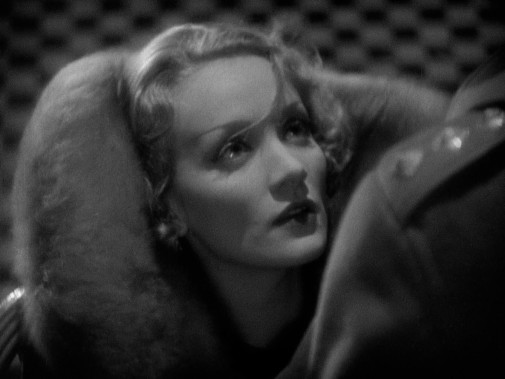
Befitting its main setting, Shanghai Express works as a train ride given cinematic form. It tells the story of a misadventure during the titular locomotive's travel when, in 1931, the train is stopped by Chinese officers in search of a rebel agent. The authorities fail to find the man and, later on, he reveals himself and sequesters his fellow passengers. Warlord Henry Chang is looking for someone important he can trade for a captured aide and he seems to find the prized prisoner in British Captain Donald Harvey. However, spoiling his plans, the beautiful courtesan Shanghai Lily offers herself instead of Harvey, wanting to protect the man who was once her lover. Blackmail, rape, and murder take place in this tale before a happy ending arrives, the final destination of a nightmare trip.
All this plot notwithstanding, Shanghai Express is quite short, running only 82 minutes. Its pace is not necessarily quick, though. More than even the usual languidness of the Sternberg-Dietrich films, this gorgeous dream of celluloid feels like it lives in the liminal space between waking life and unconsciousness. The lull of the train's movement is hypnotizing, its constant sound as narcotizing as the constant dissolves that take the melodrama of the plot to extremes of poetic abstraction. Watching Shanghai Express is to be given a kiss of inebriation, to lose oneself in silvery images and seducing glances, dreams of glamour, blood, smoke. Sternberg even directed his actors according to an idea of cinema as a half-dream on a locomotive. He wanted his actors to talk like a train, their speech deliberately delivered in a monotone. In other words, he looked in the face of naturalism, spat on it and encouraged the cast to do the same.
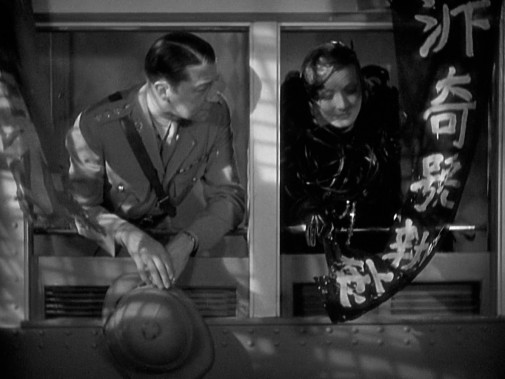
None of Sternberg's chosen thespians takes to this approach quite as perfectly as Dietrich. Some ungenerous viewers might characterize what she does as little more than a collection of artful poses but one shouldn't go around thinking that such a thing is a necessarily bad strategy to film acting. Despite doing much more than just posing, Dietrich's relationship to the camera and the studio lights is its own kind of love story, a romantic dance that's perfectly calculated but never comes off as self-conscious. Early on, when disclosing her new moniker to Harvey, the way Dietrich refuses to look at the man, how her hand elegantly fiddles with a banner, evokes a strange feeling of melancholy, the want for what she cannot have. It's a gesture that indicates confidence infused with studied aloofness, manipulation with a ring of honesty, a lie that speaks the truth.
With little more than a tilt of the head and slight movement of the gloved hand, the actress has created a delicate mood and defined how we should approach this film and character. She illuminates their heady mix of sensuality and yearning, glowing light undercut by deep shadows. It's not close to how people behave off-screen, not at all. However, even as it's far from reality, it has value. The imitation of real life isn't the only way to make art and there's a craft in the overt artifice. Just notice the way Dietrich handles Travis Banton's luxurious costumes and the script's bouts of humor. The costumes never wear her, their filigreed glitz expertly used by the actress to draw attention to her every motion, her precise slinkiness.
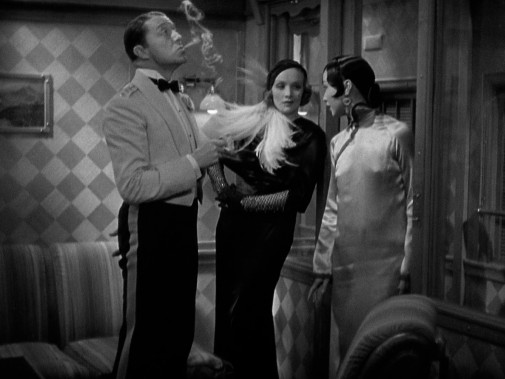
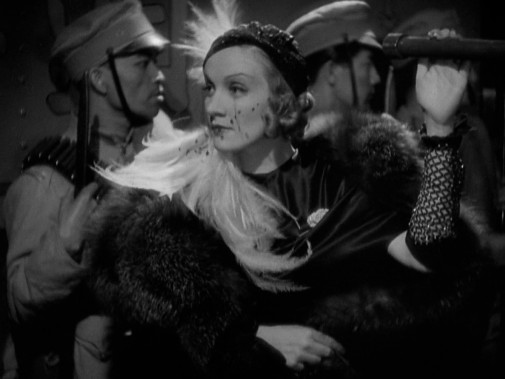
As for the comedy, there are few things funnier than how Dietrich negotiates Pre-Code innuendo. The way she fondles a gun barrel is priceless, for example. You can't get much more explicitly phallic and yet, Dietrich's performance never falls into bawdiness, always floating by on a cloud of sophisticated sexuality. Furthermore, she's playful, even when the situations drive her character to extremes. Watching her walk down a train's corridor as she prepares to seduce her target is a delight. It's a show of the jittery nerves that take hold of an actor before their time to appear on stage. Then, by the end, there's giddiness to her parody of insincere demureness. A lovely and sweet final note for Dietrich to punctuate the greatest seducer she ever played. Still, if this performance wasn't already multifaceted enough, there are great depths of feeling and even darkness to this Shanghai Lily.
Like many a Pre-Code heroine, she is an archetypal fallen woman. Nonetheless, Dietrich's Lily doesn't wear the title with shame, preferring to veil herself in eroticism instead. There's a vague sorrow to the performance but that never manifests as moral mortification. It's not exactly pride that keeps the shame away, rather an insouciant obstinance, the impetus of a diva who knows she's the most beautiful creature most people will ever see. The conclusion shows us the character's nobility without asking her to dim her light. Instead of going for beatific theatrics, Dietrich performs her character's decency while still playing her as a dazzling vixen, eliciting our respect, not inspiring pity. As much as Lily's willing to sacrifice her body and her life, Dietrich assures us that her dignity is never at stake. Even as she ponders on her fate, alone in the darkness, she's a goddess. Do her hands tremble or is the train shaking? It doesn't matter, Dietrich is always in control, she's always ravishing.
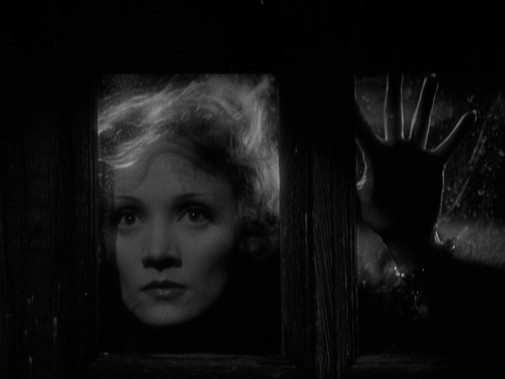
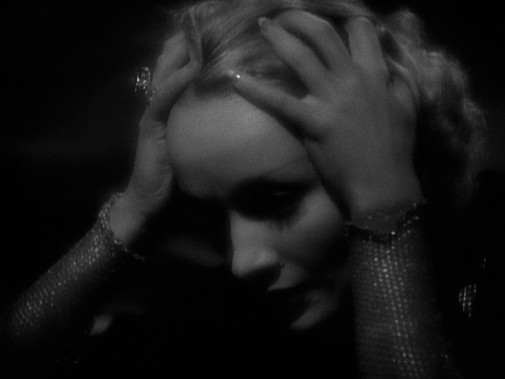
For the 5th Academy Awards, Shanghai Express received nominations for Best Picture, Director, and Cinematography, winning the latter. The movie, a smash hit at the box-office, was popular with both critics and audiences, a consequence of its intoxicating quality and the rising stardom of Dietrich. While the actress had been nominated the year before for her first Paramount movie, Morocco, she was left out of the 1932 Oscar lineup (the Oscars had not yet settled on five-wide acting categories). Instead, AMPAS honored two theater sensations, Helen Hayes in The Sin of Madelon Claudet and Lynn Fontanne in The Guardsman, as well as the Pre-Code era's unlikeliest star, Marie Dressler in Emma. Hayes would win for a variant of the fallen woman trope that isn't half as subversive as Dietrich's. If the Teutonic diva's take on the type was obstinately shameless, Hayes' approach is demonstratively moralistic. In the match of anti-sentimentalism versus sudsy melodrama, the latter won at the Oscars.
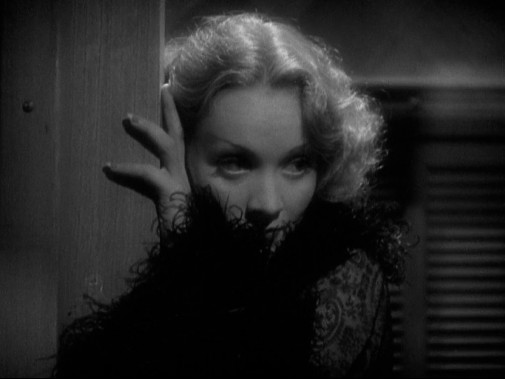
How many Oscar nominations do you think Dietrich deserved across her long Hollywood career?



Reader Comments (14)
If Ampas had already established the 5 nominees and had introduced the supporting thespians categories you could have found Marlene and Anna May Wong among the nominees and that would have been sensational
Marlene was deserving of many nominated appearances with the academy that she never received. Funny enough her one nomination I could do without.
Off the top of my head I'd certainly consider her in leading for Blue Angel, Shanghai, Blonde Venus & Scarlett Empress. Being more familar with 50's cinema she'd easily make my lineups in supporting for Witness for the Prosecution and Touch of Evil. I'm fully aware she was ran in lead for Witness but for me it's a supporting role.
It's odd how she was only nominated once given her long standing impression as a performer. The year of Shanghai was quite a terrible lineup for actress and she'd easily win if nomination for me.
She deserved the nomination, and is my personal winner.
A beautifully written analysis.
Dietrich is movie star perfection in Shanghai, and since the Academy clearly loved the movie, her lack of even a nomination is such an odd omission.
Fontanne strikes me as a perfunctory nod based on her theatrical rep. She's merely fine in The Guardsman, nothing more, in a rather thankless role. Alfred Lunt, on the other hand, is hammy and terrific and deserved to round out his category. Wish he would've done more film.
Marie Dressler, Helen Hayes & Dietrich would've made a great trio; three great actresses with very different acting styles.
I was just reading about this year in Inside Oscar, which I highly recommend checking out. Dietrich would have made my list but I actually was won over by Eilers in Bad Girl. Hayes was not a personal favorite.
Anna May Wong would have been a very cool nomination for Shanghai if they had the supporting categories by then, though my vote for the win would probably be Joan Crawford in Grand Hotel. I love that movie and its abundance of celebrities.
Nah, two Grand Hotel ladies are next in line. I prefer the pieces where it's a sixth place in a five nominees field. Here you've chosen a sixth place in a three nominee field.
Nice write up. I would have rather seen her nominated for this than Morocco. Her allure was totally unique which is why she was able to rise and maintain her position independent of the Garbo mania which led to every studio to signed an exotic European actress (Olympe Bradna, Sigrid Gurie, Miliza Korjus and most notoriously Goldwyn's Folly-Anna Sten) in an attempt to replicate her success.
As for nominations I'd say-The Blue Angel, this film, Blonde Venus, Destry Rides Again, Touch of Evil and particularly Witness for the Prosecution. Had she allowed herself to be placed in competition in supporting where she belonged rather than lead I think she would have stood a great chance of winning there.
As much as I love Touch of Evil, I don't think Dietrich's brownface turn is more worthy than the five actual nominees that year. I do think she deserved nominations for Shanghai Express, The Devil Is a Woman, Desire and Destry Rides Again.
There are still so many Dietrich films that I need to see, but I agree that she's fantastic in Shanghai Express. Almost every frame of her in that movie could hang on a wall!
German actress and Hollywood legend Marlene Dietrich became an American citizen in 1939. She denounced her homeland and its führer Adolph Hitler. She refused invitations to return to Germany and support its efforts in WWII. Rather she donated substantial amounts of money to aid Jews escaping Germany and toured the US extensively to use her celebrity to sell war bonds. So it was surprising when the actress agreed to star in director Billy Wilder's satiric comedy A Foreign Affair. The added information that she was to play a Nazi made the decision even more astonishing.
A Foreign Affair explores the corruption of the occupying forces in Berlin. Though filmed on set in Hollywood, Wilder shot footage in Berlin to show audiences the devastation to the city from the massive bombing during the last days of the conflict. The film was a hit but immediately controversial. Some felt that American corruption in a foreign land was an unpatriotic and inappropriate choice for comedy. Others was appalled that a comedy about Nazis could be made so soon after the War. The film was ultimately banned in Germany and publicly denounced in Congress.
In hindsight, the film is slight at best. A prudish, nearly 50 year old Congresswoman Phoebe Frost travels to Berlin as part of an entourage to investigate tales of corruption among the American occupying forces. Jean Arthur in tight clothing and a tighter bun purses his lips at the sight of American GIs fraternizing with German women. She ultimately becomes infatuated with an American officer Captain John Pringle (John Lund). All three leads, Arthur, Lund and Dietrich (a new grandmother) are too old for the roles. Yet, Dietrich committed to the role and is alive in this performance. In her opening shot, Pringe leers at her through a large bullet hole in her bathroom door as Erica von Schluetow brushes her teeth. She playfully spits water at Pringle when done. That spirit of teasing sexuality is rampant and ever present in Dietrich's delightful performance.
Late in the film when Frost and von Schluetow are rivals for the affection of Pringle, Dietrich has a marvelous speech about women and men to aid the obviously inexperienced Frost address her first serious romance. Dietrich delivers the speech with a telling world weary voice that belies the affection she feels. She breaks our heart and wins our admiration at the same time. When von Schluetow is arrested at the end of the film, Dietrich is lead off by no less than five MPs under their watchful eye. The viewer is confident that von Schluetow will soon seduce the team and regain her freedom.
Reportedly Dietrich and Wilder, old friends from the 1920s German film industry, spent the off screen time bantering in German and relishing one another's company. That affable relationship imbues Dietrich's work with a sense of naughty fervor that make Erica von Schluetow one of Dietrich's finest film performances.
I agree with James that Dietrich deserved a nod for the otherwise negligible "A Foreign Affair". Also, I'd say, for "Judgment at Nuremberg" in '61. She's splendid in this ;it's perhaps her most affecting performance. Still rankles that neither she nor Marilyn Monroe (in "The Misfits") were nominated that year for such transcendent work. I doubt Dietrich would ever have gone along with supporting nominations. But I have no problem seeing her work in both "A Foreign Affair" and "Judgment" as fully developed star turns.
I'd also say that any of her five performances from 1930 to '32 would have been worthy nominees. But if only one was to be nominated, I'm glad it was "Morocco". That's the film that first fully distilled her screen image and she's sublime in it. Dietrich should have won that year. No contest.
I'd nom her for The Blue Angel 1930, Shanghai Express 2932 (Blonde Venus came out same yr, so I picked the stronger performance) n A Foreign Affair 1948.
She is good in Witness but I'd rather see Masina get in. Dietrich wld never campaign in supp category as she alws feel she is a top tier star n campaigning under supp is simply beneath her.
Same goes for Crawford who refused to go supp for The Women 1939.
A list celebs dun campaign under supp in those days, no matter how small their parts maybe. See oso Deborah Kerr in From Here to Eternity, n David Niven in Separate Tables.
She is my closest connection to Hollywood as she was born, and buried, near where I live :)
Dietrich should have been nominated for Shanghai Express alongside Barbara Stanwyck in Night Nurse. My winner that year is Joan Crawford in Grand Hotel. If I had five nominees I'd add Kay Francis in Girls About Town and Sylvia Sidney in Merrily We Go to Hell. Hayes is one of the worst winners in the category's history.